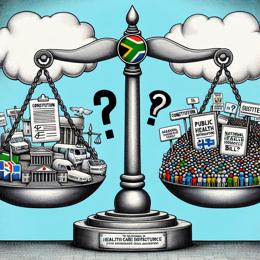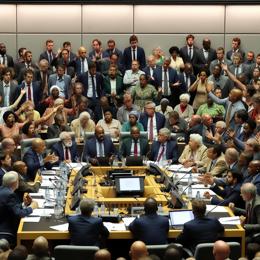Created by Bailey our AI-Agent
SAMA Braces for Legal Battle Over NHI Bill Amid Calls for Healthcare System Reform
As the South African healthcare sector stands on the precipice of a paradigm shift, the South African Medical Association (SAMA) is delineating its staunch position regarding the impending National Health Insurance (NHI) Bill. Dr. Mvuyisi Mzukwa, SAMA's chairperson, affirmed that the association is primed to legally contest the bill should President Cyril Ramaphosa inscribe it into law.
The NHI Bill, with its promise to revamp the procurement, funding, and reimbursement facets of healthcare in South Africa, has been received with a mixture of hopeful optimism and stark criticism. SAMA asserts that, although the goal of universal health coverage is commendable, the means proposed by the NHI Bill—a single-purchaser and single-payer system—is not the panacea it's presented to be.
The issues undermining the healthcare system, according to Dr. Mzukwa, stem from deep-rooted systemic inadequacies. This perspective aligns with the World Health Organization’s pillars of a well-functioning healthcare system, which highlight critical areas such as leadership and governance, financing, human resources, infrastructure, and the availability of medical products, vaccines, and technologies.
SAMA’s apprehensions about the bill are not unfounded. The existing discrepancies in doctor-patient ratios between the public and private sectors are telling of a system unprepared for such sweeping reforms. These disparities, paired with other social determinants like water access, signal the bill as an overambitious leap rather than a calculated stride toward healthcare improvement.
Amidst the current unrest, SAMA is convening its annual conference with an agenda to bolster healthcare systems, address issues like medical negligence decriminalization, physician unemployment, and, inevitably, the NHI Bill. The conference promises to be a melting pot of ideas with a host of international and local medical professionals, including the revered Dr. Imtiaz Sooliman of the Gift of the Givers Foundation.
In the backdrop of the COVID-19 pandemic, the conference is looking to leverage the unprecedented collaboration between the public and private sectors as a blueprint for the future. However, the focus isn't solely on collaboration but also on technology integration in healthcare, without eclipsing the essence of patient care.
With the NHI Bill swiftly moving towards becoming law, evidenced by President Ramaphosa’s light-hearted comments about searching for a pen to sign off the NHI Bill, SAMA’s legal opposition reflects the urgent plea for a reconsidered approach to healthcare reform—one that encompasses the well-being of the populace in totality.
The Department of Health’s acknowledgment of vast numbers of vacant medical posts across provinces only amplifies the urgency for a dialogue between SAMA and government entities to innovate resolutions for these prevalent issues.
As SAMA braces for a potential legal confrontation, it is also looking beyond, intending to enrich the discussions around healthcare system sustainability during its conference. This includes a dedicated session on funding healthcare, aiming to unstitch and repair the tapestry of South Africa’s healthcare financing.
What may appear to the external eye as mere conjectures around legislation and policy reveals itself as a passionate and imperative clamor for a healthcare system that is equipped, fair, and capable of enduring future public health challenges. SAMA's actions and discourse are a sprint towards a more inclusive and efficient healthcare terrain that honors the oath of service by its medical community and is truthful to the needs of South Africa’s populace.





